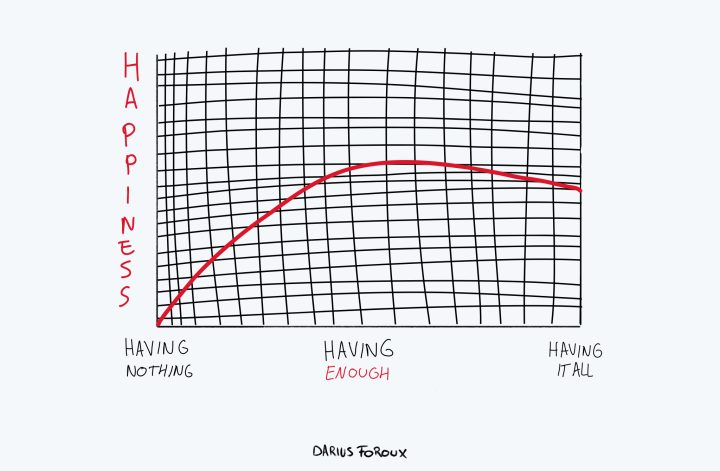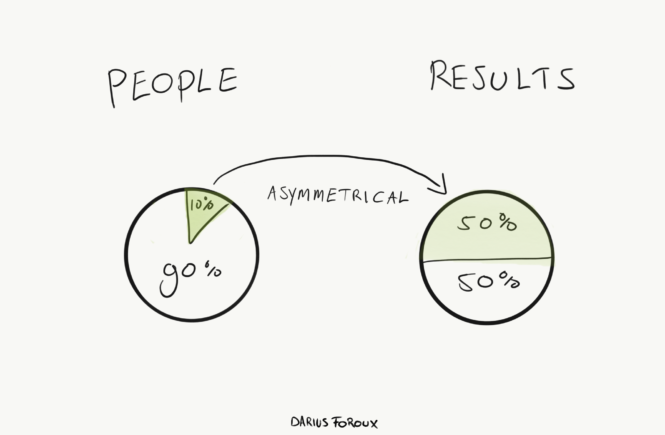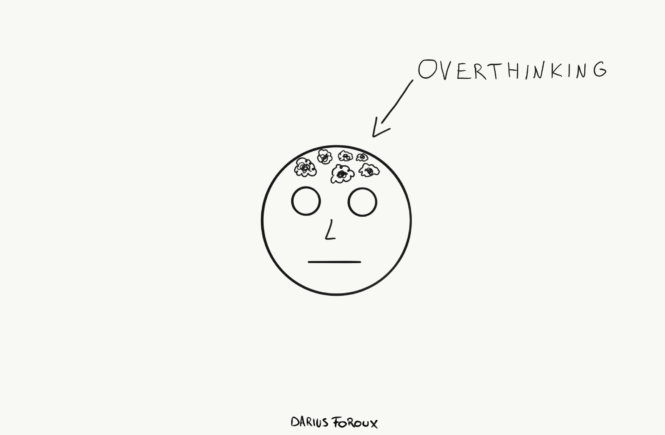A foundational idea in modern society is that we all need to strive for more. You can see this everywhere, from movies, books, articles, to the way people speak in private.
We often say something like, I want to be.. smarter, more successful, better, faster, etc. We’re always thinking about some kind of future moment when we will have more of whatever we’re after. More money, status, respect, love.
You see the desire for more in many ads as well. One of the best examples is a marketing campaign that Mcdonald’s ran a few years ago called “You deserve more.” It’s about their breakfast, and apparently, Micky D thinks we all deserve to have “more savory, more sweet.”
But it’s not the fault of companies and advertising agencies. They just give us what we want.
Many of us really believe that our desire for more is what makes us happy. The more we strive, the happier we become—whether during the pursuit, or when we accomplish our goals.
The tragedy is that the desire for more doesn’t create happiness but destroys it. The human mind is not one that’s appreciative of the present. As soon as we accomplish something, we become restless. We need to accomplish and have even more.
We live in a world where Chanel can increase their bags by nearly 60% without any pushback from their customers. If we want something, we need to have it, no matter what it costs or how much we have to sacrifice.
Our mind always comes up with new stories and reasons to strive for more. You can always upgrade your life, no matter how good it already is.
What happened to being okay with what you have?
I’m taught that if you can’t afford something, you just don’t buy it and get on with your life. When I got my driving license, I BADLY wanted to buy a BMW 3 series coupe, but I didn’t have the money.
My parents couldn’t financially support me, nor did they want to, so I bought an old Peugeot 106 instead. It was old and busted. I installed a new cd-player in the car, but the standard sound system was so bad music sounded like it was coming straight from a 1930s gramophone player.
I looked for a picture of my own car, but I couldn’t find any. It wasn’t worth taking a picture of, to be honest. But it looked a bit like this one (mine was in worse shape).

But the car gave me freedom. I didn’t have to take the bicycle or bus anymore to school. It was good enough for me. And I also learned an important lesson about relationships and people.
The main reason I wanted that BMW was to impress others. I thought I would be cool and girls would want to date me because of a car. But when I got a girlfriend shortly after I bought my car, she told me, “No one gives a shit about your car if you’re an asshole.”
Years later, as I started getting more serious about philosophy, I learned that it’s an age-old concept. One of the earliest philosophers, Heraclitus, who lived in Ephesus, which was then part of the Persian Empire around 2500 years ago, said:
“Just keep in mind: the more we value things outside our control, the less control we have.”
It reminds us that the more you value external things, the less you value yourself. I’m glad I learned these things at a young age. Because I realized that you can be happy even if you don’t have everything you want.
But these days, when we can’t afford something, we simply borrow money or get another job. Just get into debt or sacrifice your time and energy so you can purchase something.
How ancient wisdom can help you to crave less
The philosophy of Stoicism is great for overcoming our natural desire to do and acquire more. Seneca, the Stoic philosopher who had first-hand experience with being wealthy, had a firm belief about the desire for more. He said:
“It is not the man who has too little, but the man who craves more, that is poor.”
The idea is that true wealth means you’re good with life the way it is, no matter how many possessions you have, it will be enough.
But that’s a hard mindset to obtain because we’re all so restless. When we give in to our cravings, we only end up craving more.
The best way you can overcome this superficial way of life is to continuously work on your wants. You can’t stop yourself from being triggered by certain desires.
The other day I saw someone in the business park where I have an office with his new car. It was a Lamborghini Urus. I’m not a car person, but that’s a really pretty car. The combination of performance and beauty makes it a highly desirable object.
When I saw the car, I thought, “I would love to own a car like that.” And then, I noticed that my mind started thinking of ways to earn more money or whether I should sell off some assets.
This is what the human mind does. When you see someone with a desirable career, your mind might downplay your own, and say, “Maybe you should change your job.” I became aware of the thought pattern and quickly stopped it by ignoring my thoughts.
The truth is that more things will not make you happier. In fact, I believe that anything beyond having enough can only destroy your happiness. That’s because chasing desires is an endless pit that can really harm you.
In the spirit of another Stoic, Epictetus, who said that “wealth consists not in having great possessions, but in having few wants,” let’s look at ways we can make sure we have few wants.
- Tell someone you’re grateful: This is a more effective strategy than keeping it to yourself. When you only think of the things you’re grateful for, the feeling of gratitude hardly sticks. But when you tell someone you’re grateful for the relationship you have, whether that’s a friendship, romance, or in a professional setting, you also make others feel good. You can also tell others how grateful you are for everything else in your own life. People who are grateful usually don’t have the desire to change anything because they value what they have.
- Have a plan B and C: When you think you need something, you become dependent on that thing. Let’s say you think you need to get a promotion or a new job, you identify your self-worth with that job. But as the Stoics knew, we hardly ever get what we want. That’s why it’s important to have multiple backup plans. Never depend on a single job, person, goal, and so forth. If something doesn’t work out, move on to something else. Movement will keep you active. And an active person is less susceptible to desiring unnecessary things.
- Do things you actually enjoy: This sounds obvious, but how often do you do things you don’t enjoy? If you have a job you don’t enjoy, you’re doing that for the majority of your time. Not a good situation to be in. Optimize your life for inner satisfaction. Find joy in what you do. That doesn’t mean you should chase pleasure. You can also get a sense of inner satisfaction when you do a job well. No matter what the job is.
- Live simply: We all get used to everything. When you upgrade your lifestyle, you get used to it and anything less than what you have will feel like torture. The best way to avoid the hedonic treadmill is to never get on it. Live simply, no matter how much money you have.
- Stay tough: We can make life so comfortable that we don’t even have to get out of the house to live well. You can earn a living from home. You can work out at home. You can turn up the heat when it’s cold. You can order any food you like. But comfort makes you soft. And life is hard. So it’s better to be hard as a person. Take the stairs, continue your plans even if the weather sucks, travel lightly, walk to places you can, and so forth. Avoid taking the easiest option. Sure, it’s good to save time. But when you take that mindset too far, you sacrifice something else that’s more important: Your inner strength.
Happiness is not an external event or process. It’s a by-product of living a good life. When you always strive for more, you live a restless life. That’s not a life of happiness.
When you slow down and actually focus on the things that give you inner satisfaction, you realize you already have everything inside you to be happy.




